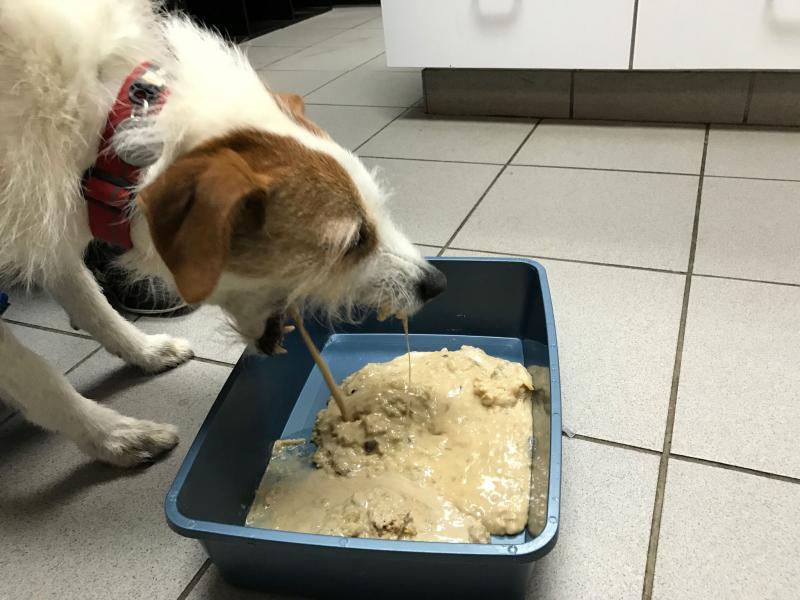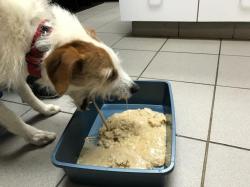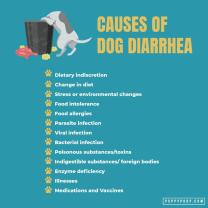Why is my dog throwing up not eating?
I am not a veterinarian, but I can offer some general information that might help you understand why your dog is vomiting and experiencing a loss of appetite. It's important to note that these are just possible causes, and a veterinarian is the best person to diagnose and treat your dog's specific situation.
Dietary indiscretion: Dogs may eat something they shouldn't, such as spoiled food, garbage, toxic plants, or foreign objects, leading to vomiting and a loss of appetite.
Gastrointestinal issues: Infections, inflammation, or other problems in the stomach or intestines can cause vomiting and decreased appetite.
Pancreatitis: Inflammation of the pancreas can result in vomiting, abdominal pain, and a reluctance to eat.
Infections: Viral or bacterial infections, such as parvovirus or bacterial gastroenteritis, can lead to digestive issues and a lack of appetite.
Liver or kidney disease: Dysfunction in these organs can cause nausea, vomiting, and a reduced appetite.
Toxic substances: Ingesting toxic substances, including certain plants, household chemicals, or medications, can lead to vomiting and a lack of interest in food.
Motion sickness or stress: Dogs may vomit and refuse to eat due to motion sickness during car rides or stress from changes in their environment.
Inflammatory bowel disease (IBD): Chronic inflammation of the digestive tract can cause vomiting, diarrhea, and weight loss.
Obstruction: Ingesting objects that can't pass through the digestive system can cause vomiting and appetite loss.
Parasites: Intestinal parasites, such as worms, can lead to digestive issues and a decreased appetite.
If your dog is vomiting and not eating, it's crucial to consult with a veterinarian promptly. The vet can perform a thorough examination, run diagnostic tests, and recommend appropriate treatment based on the specific underlying cause. Early intervention is essential to ensure the best possible outcome for your dog's health.
Reasons why a dog might be vomiting and experiencing loss of appetite
A dog vomiting and experiencing loss of appetite can be concerning, and there are many potential causes ranging from mild to serious. Here are some possible reasons:
Common, less serious causes:
- Dietary indiscretion: This is the most frequent cause, involving eating something they shouldn't have, like garbage, plants, or spoiled food.
- Sudden diet change: Abruptly switching your dog's food can upset their digestive system.
- Intestinal parasites: Worms or other parasites can cause digestive upset and nutrient absorption issues.
- Motion sickness: Some dogs get carsick or motion sick on boats or planes.
- Stress or anxiety: New environments, travel, or changes in routine can affect some dogs' appetites.
More serious causes:
- Bloat (gastric torsion): A life-threatening condition where the stomach fills with gas and twists. Requires immediate veterinary attention.
- Pancreatitis: Inflammation of the pancreas, causing vomiting, diarrhea, and abdominal pain.
- Kidney or liver disease: These conditions can affect appetite and cause vomiting.
- Viral or bacterial infections: Several infections can cause digestive issues, including parvovirus, distemper, and bacterial infections.
- Foreign body obstruction: If your dog swallowed something that got stuck in their digestive tract, it can cause vomiting and loss of appetite.
- Toxicology: Ingestion of poisonous plants, medications, or other toxins can cause serious illness, including vomiting and loss of appetite.
- Cancer: Although less common, certain cancers can also cause these symptoms.
What to do:
- Monitor your dog: Pay attention to the frequency and severity of vomiting, the presence of blood or mucus in vomit, and other symptoms like diarrhea, lethargy, or abdominal pain.
- Withhold food for a few hours: This can give your dog's stomach a chance to settle. Offer small amounts of water frequently.
- Contact your veterinarian: If vomiting persists, your dog seems lethargic or in pain, or you suspect a more serious cause, seek immediate veterinary attention.
Remember: I am not a veterinarian and cannot provide medical advice. If you are concerned about your dog's health, always consult a qualified professional.






